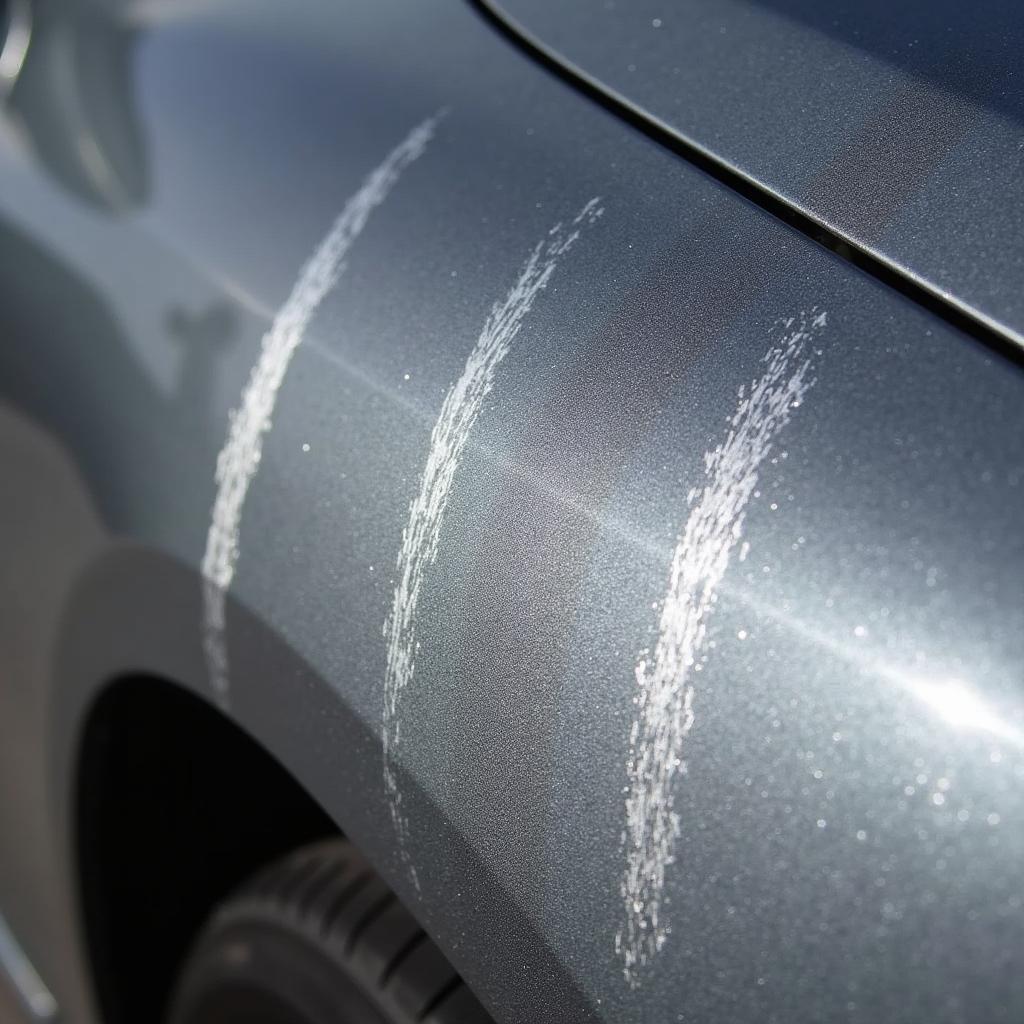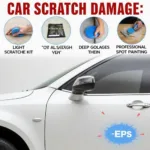Dealing with unsightly scratches on your car’s pristine paint job? Don’t fret! This comprehensive guide delves deep into the world of car detailing and provides expert advice on paint scratch repair, empowering you to restore your car’s showroom shine.
Understanding the Enemy: Types of Car Scratches
Before diving into repair methods, it’s crucial to identify the type of scratch you’re dealing with. Scratches are categorized by their depth and severity:
- Clearcoat Scratches: These are the most superficial, affecting only the clear coat layer. They often appear white or lighter than your car’s paint.
- Paint Scratches: Deeper than clearcoat scratches, these penetrate the paint layer, exposing the primer underneath.
- Deep Scratches: These reach the metal beneath the primer, potentially leading to rust if left untreated.
DIY or Professional Help?
Choosing the right approach depends on the scratch’s severity:
- Clearcoat Scratches: Often fixable with DIY methods like scratch removers or polishing compounds.
- Paint Scratches: May require touch-up paint and clear coat application, demanding a bit more finesse.
- Deep Scratches: Best left to professional car detailers or auto body shops due to the risk of rust and the need for specialized tools.
DIY Car Scratch Repair: A Step-by-Step Guide
For minor scratches, you can achieve impressive results at home with the right tools and techniques:
Materials Needed:
- Car wash soap and water
- Microfiber cloths
- Masking tape
- Rubbing compound
- Polishing compound
- Wax
Steps:
- Wash and Dry: Thoroughly clean the scratched area with car wash soap and water to remove dirt and debris. Dry completely with a microfiber cloth.
- Assess the Scratch: Determine the severity and type of scratch to choose the appropriate repair method.
- Apply Rubbing Compound (if needed): For deeper scratches, apply a small amount of rubbing compound to a clean microfiber cloth and gently rub it onto the scratch using back and forth motions. Wipe away any excess compound.
- Polish the Area: Apply a polishing compound to a fresh microfiber cloth and buff the area using circular motions. This step removes any remaining imperfections and restores shine.
- Wax for Protection: Once satisfied with the repair, apply a layer of wax to the area to protect the newly repaired surface and enhance its gloss.
Seeking Professional Expertise: When to Call the Pros
While DIY solutions work well for minor scratches, certain situations call for professional intervention:
- Deep Scratches: Professionals have the tools and expertise to repair deep scratches effectively, preventing rust and ensuring a seamless finish.
- Extensive Damage: If you have multiple scratches, dents, or paint chips, seeking professional help will save you time and ensure a high-quality repair.
- Lack of Confidence: If you’re unsure about tackling the repair yourself, it’s always best to consult a professional.
Preventing Future Scratches: Proactive Measures
Prevention is always better than cure! Implement these tips to minimize the risk of future scratches:
- Regular Washing: Frequent car washes remove abrasive dirt and debris that can cause scratches during driving.
- Covered Parking: Opt for covered parking whenever possible to protect your car from harsh weather elements and accidental bumps.
- Safe Driving Practices: Maintaining a safe distance from other vehicles and being mindful of obstacles on the road can significantly reduce the likelihood of scratches.
Conclusion
Maintaining your car’s pristine appearance doesn’t have to be a daunting task. By understanding the nuances of car detailing and paint scratch repair, you can confidently address minor imperfections yourself or seek professional help when needed.
Remember, a little TLC goes a long way in preserving your car’s value and keeping it looking its best for years to come.
FAQs about Car Detailing and Paint Scratch Repair
Q1: Can I use toothpaste to remove car scratches?
While toothpaste is often touted as a DIY scratch remover, it’s not recommended for car paint. Toothpaste is abrasive and can actually cause more damage to your car’s clear coat. Opt for dedicated car scratch removers or polishing compounds instead.
Q2: How much does professional car scratch repair cost?
The cost of professional repair varies widely depending on the scratch’s severity, the type of repair needed, and the shop’s labor rates. Minor scratch repairs can range from $50 to $200, while more extensive damage can cost upwards of $1,000.
Q3: Can I apply touch-up paint myself?
Yes, you can touch up minor paint chips yourself using a car paint repair pen for sale at most auto parts stores. However, achieving a seamless finish requires practice and patience. For larger areas or if you’re unsure, consulting a professional is recommended.
Q4: How often should I wax my car?
Waxing your car every three to four months provides a protective layer against UV rays, contaminants, and minor scratches. However, factors like weather conditions and driving habits can influence waxing frequency. Consult your car’s owner’s manual or a trusted detailer for specific recommendations.
Q5: What is a ceramic coating, and do I need it?
A ceramic coating is a liquid polymer applied to a car’s paint, creating a semi-permanent bond that protects against scratches, UV rays, and chemical stains. While not essential, ceramic coatings offer superior protection and enhance gloss compared to traditional waxes.
Need help with car scratch repair?
Contact us via WhatsApp at +1(641)206-8880 or email us at cardiagtechworkshop@gmail.com. Our team of experts is available 24/7 to answer your questions and provide the best solutions for your car care needs.
You can also find more information about DIY car scratch repair and car scratch repair kits on our website. Check out our articles on diy repair scratch car paint and how to repair stone chips in car paint for detailed guides and helpful tips.
For those interested in professional solutions, we have a comprehensive car paint scratch repair review section that provides insights into various service providers and their offerings.



